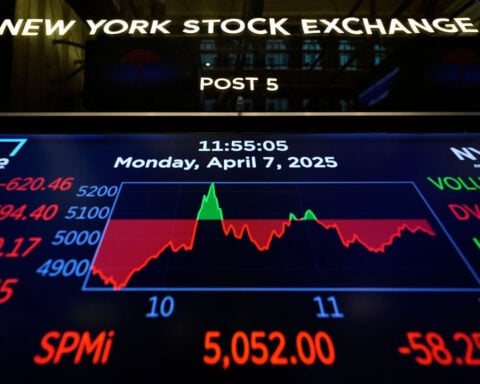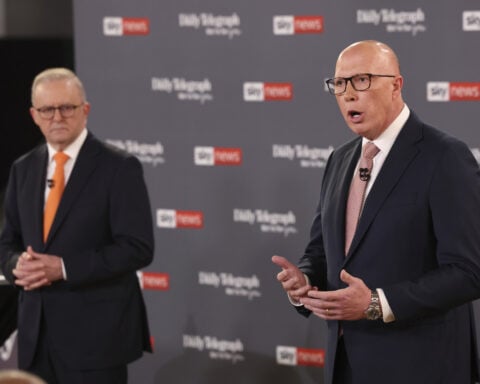By Alexandra Alper, Karen Freifeld and Stephen Nellis
WASHINGTON (Reuters) - The Biden administration said on Tuesday it plans to halt shipments to China of more advanced artificial intelligence chips designed by Nvidia and others, part of a suite of measures aimed at stopping Beijing from getting cutting-edge U.S. technologies to strengthen its military.
The rules, described by senior administration officials in a press briefing on Monday evening, restrict a broader swathe of advanced chips and chipmaking tools to a greater number of countries including Iran and Russia, and blacklist Chinese chip designers Moore Thread and Biren.
The new measures aim to hamper China's military development by closing loopholes in regulations released last October and will probably be updated "at least annually," according to Commerce Department Secretary Gina Raimondo.
The goal is to limit China's access to "advanced semiconductors that could fuel breakthroughs in artificial intelligence and sophisticated computers that are critical to (Chinese) military applications," she said, stressing the administration was not seeking to hurt Beijing economically.
The United States and China are locked in a years-long technology war, but the sweeping curbs released last October further escalated tensions between the superpowers.
CHINA-ONLY CHIPS HIT
In a statement following publication of the rules, Top AI chip designer Nvidia said it complies with regulations and does not expect "a near-term meaningful impact on our financial results."
The company, whose shares fell 7%, has made chips such as the A800 and H800 that walked right up the line of the previous rules to continue selling to China, and AMD, also impacted by the rules, has said it plans a similar strategy.
Nvidia's business has soared since the imposition of last year's rules because its China-only chips are still better than alternatives. The Silicon Valley firm is currently selling almost every chip it can procure as worldwide demand outstrips supply, but would be hurt in the long term as Chinese chip firms seek to fill any voids left by U.S. companies.
Nvidia's A800 and H800 chips will be hit by the new regulations, due to a change in chip parameters aimed at capturing a greater number of chips.
But the rules will exempt most consumer chips used in laptops, smartphones and gaming, though some will be subject to licensing and notification requirements by U.S. officials.
"The fact is, China, even after the update of this rule, will import hundreds of billions of dollars of semiconductors from the United States," Raimondo said, emphasizing that the goal of the measures was not to hammer U.S. companies.
The previous rules imposed a two-pronged test that measured both a chip’s computing performance and its ability to communicate with other chips, an important measure in AI supercomputers where thousands of chips are strung together to chew through huge amounts of data.
Nvidia and Intel created special chips for the Chinese market that retained the powerful computing capabilities but limited communications speeds to stay inside the previous rules.
Biren and Moore Thread, whose U.S. suppliers will now face a tough licensing requirement before shipping products to them, are both Chinese startups founded by former Nvidia employees in China and aim to compete with the U.S. AI chip giant.
The rules released on Tuesday eliminate the communication speed limits and focus on computing performance, which will have the effect of halting sales of Nvidia's A800 and H800 chips for the China market, according to a senior administration official.
U.S. officials on Tuesday added a new measure to restrict chips that exceed a certain level of "performance density," a measure focused on how much computing power can be packed into a given amount of silicon, a senior administration official said.
The senior administration official said this rule was meant to prevent companies from trying to work around restrictions on full chips by using a technology called "chiplets," where firms could try to join together small pieces called chiplets into a large chip that violates the rules.
Reuters reported in July that chiplets have become a core part of China’s technology strategy to advance its chip industry, and analysts have said that Chinese companies could use the technology to evade U.S. restrictions.
LICENSING EXPANDED
The new measures also expand licensing requirements for exports of advanced chips to more than 40 additional countries that present risks of diversion to China and are subject to U.S. arms embargoes, the officials said.
That measure appears to build on a letter received by Nvidia in August that it described as restricting shipments of its A100 and H100 chips beyond China to other regions including some countries in the Middle East.
Confirming a Reuters report, chips will be barred from being sent to units of firms located anywhere in the world if their parent companies are headquartered in China, Macau and other arms embargoed countries. The move is part of a bid to keep the chips from being illegally smuggled into China or remotely accessed by Chinese parent companies.
The Biden administration also hit 21 countries outside China with a licensing requirement for chipmaking tools. It also broadened the list of equipment restricted from going to that country to include some deep ultraviolet (DUV) lithography systems.
DUV is less advanced chipmaking equipment than state-of-the art extreme ultraviolent equipment (EUV), which has not yet been shipped to China, but can make chips nearly as advanced at greater cost.
Officials took pains to stress that Chinese officials were warned the rules were coming by National Security Advisor Jake Sullivan, Treasury Secretary Janet Yellen and Commerce Secretary Gina Raimondo, confirming a prior Reuters report.
The Semiconductor Industry Association said in a statement it was "evaluating the impact" of the new rules and urged the administration to work with allies. "Overly broad, unilateral controls risk harming the U.S. semiconductor ecosystem without advancing national security," the group said.
(Reporting by Alexandra Alper, Karen Freifeld, Stephen Nellis, David Shepardson and Max A. Cherney; Editing by Chris Sanders and Jamie Freed)

 Trump has begun another trade war. Here's a timeline of how we got here
Trump has begun another trade war. Here's a timeline of how we got here
 Canada's leader laments lost friendship with US in town that sheltered stranded Americans after 9/11
Canada's leader laments lost friendship with US in town that sheltered stranded Americans after 9/11
 Chinese EV giant BYD's fourth-quarter profit leaps 73%
Chinese EV giant BYD's fourth-quarter profit leaps 73%
 You're an American in another land? Prepare to talk about the why and how of Trump 2.0
You're an American in another land? Prepare to talk about the why and how of Trump 2.0
 Chalk talk: Star power, top teams and No. 5 seeds headline the women's March Madness Sweet 16
Chalk talk: Star power, top teams and No. 5 seeds headline the women's March Madness Sweet 16
 Purdue returns to Sweet 16 with 76-62 win over McNeese in March Madness
Purdue returns to Sweet 16 with 76-62 win over McNeese in March Madness







